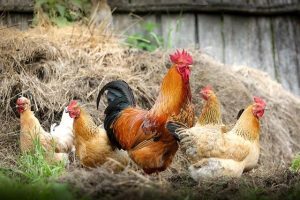
Recently, I dropped by someone’s place for the first time, and was astonished to find chickens clucking around her front yard. The property was near a busy intersection and I wondered aloud whether she wasn’t worried about her chickens getting hit by a car. She replied that she wasn’t concerned, because they knew to stick around home. Only in recounting the incident did I realize I’d effectively asked her the old riddle “why didn’t the chickens cross the road?”
Late one Sunday afternoon, we caught a glimpse of our neighbours running past our living room window. When my husband opened the door to greet them, they explained that they were just trying to catch their pet, a foster dog they had recently adopted. It was missing a limb, and she explained that it was soon going to receive a bionic leg. If they couldn’t keep up with a three-legged dog, I don’t know how they will manage when it has four!
My father spent his 50th birthday in a memorable way, not celebrating, but rounding up runaway cattle with friends and family. As each successive group showed up to search, enthusiasm ran high, which quickly waned as they navigated difficult terrain on acres of bush and fields. There was danger that a cow could run onto a road and cause an accident, or that it would leave hoofprints on a golf club’s manicured lawns, or trample crops. It was September, so the corn stood tall in the fields, and my uncle brought a horse to ride so that he could see over the stalks. It was a gong show. Weeks went by before all the cows were found and returned to our pasture.
Animal lessons aren’t necessarily limited to children’s storybooks. I understand the attraction of being free of fences, and how the grass seems greener on the other side. Sometimes I’ve wished I could just run away from difficult circumstances or restrictions myself. Unfortunately, running away usually just creates a host of new problems.
Unlike animals, humans can think through more options, grant themselves little freedoms. We can resist coercion and calculate the cost of our choices. We have free will, and even free won’t. Even if all appears to be lost, Viktor Frankl said that that we still can have the last of human freedoms, “to choose one’s attitude in any given set of circumstances, to choose one’s own way.”
Limits don’t have to hamper freedom, and in fact often are a catalyst in creatively working out new solutions. Sometimes, it just makes sense to stay close to home.